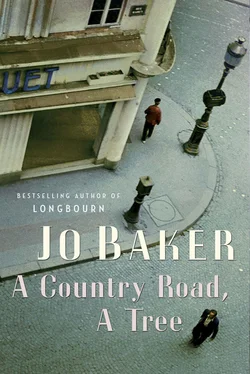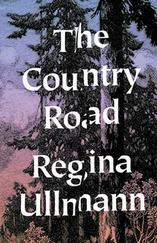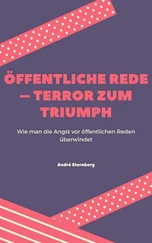“How long until the bus comes?”
He checks his watch, turns his wrist to show its face to her. She nods, sits stiffly, hands folded in her lap. He remains silent. He rubs at the back of his neck; it’s prickling.
“Who will bury them?”
She speaks low and without turning towards him. He looks round at her, the better to make out what was said. She is grey under the eyes.
“I mean, who will pay for it?” she adds.
“Suzanne—”
“Will they do it? Will the administration pay for the funerals?”
“Suzanne, please.”
“Or the police? Is it their job to organize the…the disposal? I mean, they don’t actually do anything to stop people being killed, so they must at least deal with the results.”
“Suzanne—”
A bus pulls in at a nearby stand; the engine idles, phlegmy. People file on-board. Some of the passengers are looking at them.
“Or the town hall? The municipality? Is it their responsibility now?”
He slides an arm around her. He pulls her tight, hard; she lets herself be drawn in against him, but just stares down at her worn-soft shoes and shakes her head, and talks almost to herself.
“Or will the families have to? Because—” A blot falls on to her lap, and then another. She sniffs. “Yesterday all those people—”
He rubs her arm. He whispers, “Whisht.”
Her head hangs; she skims her eyes with the flank of her hand. She blows out a long breath. She is trying. She is really trying to stop. And one mood can set aside another. Irritation helps.
“I don’t know how you stay so calm,” she says.
Another bus pulls in, rattles near them. Diesel fumes and tobacco smoke.
“I’m not calm.”
Pink-eyed, she glares at him. “Well, you seem it. Calm and quiet.”
Maybe one day there will be words. Maybe silence will be all that there ever is.
“I can’t think about it now. I can’t do it justice.”
After a moment, she asks, “Aren’t you scared?”
“Yes.”
“You don’t look scared.”
“I’m terrified.”
Her lips are pressed tight; her eyes are wide and sore-looking. “You’re impossible.”
A bus pulls in at their stand. The door heaves open. He gets to his feet and offers her a hand.
“Come on,” he says. “That’s us.”
—
Later, much later on, they are shown into an afterlife of broken chairs and crates, of empty bottles worn misty at the shoulders. The patron goes back into the little locked-tight café and sets about chinking glasses and softly singing. A few bentwood chairs have been drawn round an upended barrel, where there’s an ashtray and a candle burning in a bottle. That’s all the light there is. Even the air feels crowded, the smells of smoke and stale wine and old coffee jostling together. She sinks on to one of the chairs; he folds himself down on to another. After a moment, he picks a cigarette end out of the ashtray, examines it, then puts it back.
He gets up again to help Suzanne off with her bag, and she manages to lift an arm, to tilt her head out of his way. He sinks down on to the little creaking chair and takes the weight off his aching feet again. It is an act of will not to bend down and start taking off his boots.
The patron comes through with three tumblers of red wine, rims pinched together in his fingertips, which leaves his other hand free to carry a plate of charcuterie. He sets all this down on the barrel-top. And now they’re bolt alert. They glance at each other, then at the patron as he ambles across to the stacked crates in a corner. Then they stare at the plate.
The patron shifts boxes, chairs; there is air-dried ham and blood-sausage and an unspoken exchange between them — Should we…? Could we just…? — then there’s a creak. Behind them a door opens and there’s a gust of cellar air. Then he sees, and her name is on his lips — Jeannine— Gloria. Her face is shadowed, lined: she is ten years older than when he saw her last, just months ago. They clasp hands.
“Good evening,” he says.
She kisses him. He feels the scratch of his unshaven skin against her cheek. “Irishman.”
She dips down to kiss Suzanne too.
“My God,” Suzanne says.
He speaks lightly. “Who else have you got tucked away in there?”
The patron shrugs, pleased; he rolls a cigarette with yellowed fingertips.
Jeannine sinks down on a chair; she reaches for a slice of blood-sausage. She is thin and tired, but then everybody is thin and tired. There is something different about her now. A hardness to her that was not there before the cell was blown. The lines of her face are grim.
The ham is cool and leathery and salt. It falls into flakes on the tongue; it is so good he doesn’t want to swallow it because then it will be over. Questions suggest themselves but are dismissed; he does not know how to begin.
Suzanne manages though, simple, warm, a way that he must learn. “How are you? How has it been for you, all of this?”
Jeannine juts her chin, unforthcoming, noncommittal.
“And your family?” he tries.
“Safe. For now.”
“What happened?” he asks, and then rephrases the words almost as soon as they are spoken. “Do you know what happened?”
She reaches for a second slip of blood-sausage, folds it; it crumbles along the crease. The patron lights his cigarette. There’s the tiny crumbling of tobacco-and-paper as it burns.
“We were betrayed.”
“By whom? Do you know?”
“A priest.”
“There was a priest?” Suzanne asks.
“In another part of the network. He came to us, said he wanted to help. We took him at his word, and we were wrong. We lost so many good people because of him.”
“But a priest ?”
Jeanine tilts her head. “They’re just men.” She speaks round her mouthful. “But maybe he wasn’t even that. He’d come along with the Geste when our people were arrested. He came to watch. He liked it.”
“Name of God,” says Suzanne.
He sits back, says in English, “Fuck.”
“We were foolish,” says Jeannine. Her face is a white mask in the candlelight. “Recruiting friends, and friends of friends.” She looks at him directly for the first time with those sloe-dark Italian eyes. “Do you not think, Irishman, that that was wrong?”
He thinks, rather, of a priest. A fleshy smile, a black soutane and an incongruous whiff of cigars. Passed on the landing or the stairs, in Alfy’s building. And exactly where would a priest be getting hold of cigars, times being what they are? Cigarettes are hard enough to come by. “It was not you who betrayed us.”
“Forgive me, please,” she says. “I don’t yet have a full account of who is still at liberty and who is not. I was uncertain of your situation until Monsieur here told me he expected a Frenchwoman and an Irishman, travelling together, to pass over the border. Once in the Free Zone you have somewhere to go?” She holds up a hand. “No details, please.”
“Friends of Suzanne’s,” he says.
Suzanne says, “Where they are, they say it’s a decent place to be.”
“Good. Good.”
“And you?”
“One picks up what threads one can, and one carries on. Which reminds me. I have something for you.”
She lifts a package out of her bag, a manila envelope with a rectangular block wrapped inside it. The edges are softened with wear. She unfolds the package. She takes out a stack of banknotes. Without counting, she divides the stack, slips two-thirds of it back into the envelope. She holds the remainder towards them. They look at the money. Nobody says anything.
“Go on,” Jeannine says.
“It’s very kind of you,” he says. “But no.”
Читать дальше










